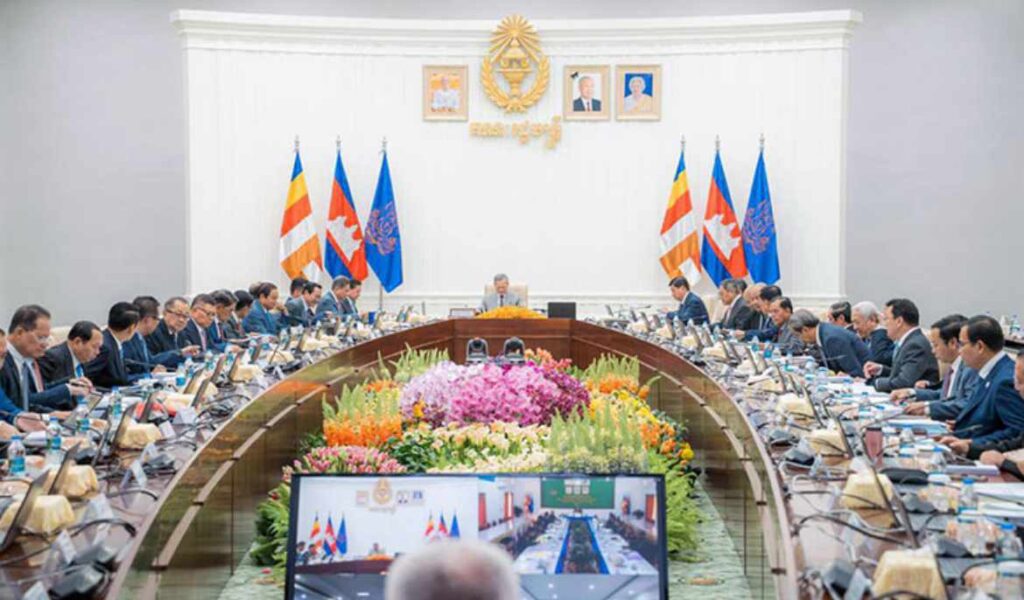The Cabinet, chaired by Prime Minister Hun Manet, has approved the draft ‘Law on Finance for Management 2026’, setting government spending at more than $10 billion for the coming fiscal year.
According to a press release issued following the plenary session on Friday, the draft law comprises six chapters and 15 articles. It places strong emphasis on enhancing national sovereignty and territorial integrity, ensuring the sustainable operation of state institutions, and supporting the Royal Government’s key policy priorities and reform measures.
The government said the ‘2026 finance plan’ will continue to underpin the implementation of the Pentagonal Strategy Phase I, which outlines six priority policy programmes, five key measures, and five strategic priorities. These initiatives are aimed at driving Cambodia’s long-term development within both domestic and global economic frameworks.
Under the draft law, total state expenditure is projected at 40,913 billion riels — equivalent to just over $10 billion — representing 18.85 percent of gross domestic product (GDP). This marks a 7.8 percent increase compared to the ‘2025 Finance Law’, reflecting the government’s continued focus on economic growth and institutional strengthening.
Economic projections for the Kingdom remain broadly positive. The Cambodian economy is expected to grow by around 5.2 percent in 2025 and 5 percent in 2026. GDP per capita is forecast to reach approximately $3,020 in 2026, up from about $2,858 in 2025.
Growth is anticipated to be driven by three key sectors — industry, services, and agriculture — with the latter continuing to benefit from gains in fisheries and animal husbandry. The average annual inflation rate for 2026 is projected to remain stable at around 2.8 percent.
The government noted that this budget framework reflects Cambodia’s ongoing efforts to consolidate macroeconomic stability, promote sustainable development, and enhance public sector efficiency in line with the nation’s long-term vision for inclusive growth.
The Royal Government of Cambodia’s adoption of the draft ‘Law on Finance for Management 2026’, which sees state spending rise by 7.8 percent compared to 2025, demonstrates confidence in the country’s robust economic performance and ongoing national development, an economist said.
Speaking to Khmer Times, economist Darin Duch said the increase in government expenditure aligns with Cambodia’s steady economic momentum and continued reform under the Pentagonal Strategy.
“The rise by 7.8 percent compared to 2025 reflects Cambodia’s robust economic growth and continued national development,” Darin noted. “The new budget is reasonable because it is designed to strengthen national sovereignty and territorial integrity, ensure the sustainable functioning of state institutions, and support the implementation of the Royal Government’s key policies and major reforms in 2026.”
He explained that the budget continues to drive Phase One of the Pentagonal Strategy, focusing on human resource development, improved infrastructure, high-quality public services, modernised agriculture, green industry, and effective public administration.
“The proposed growth in state spending reveals a thoughtful consideration of promoting economic expansion while ensuring fiscal sustainability,” he said. “This approach reflects confidence in Cambodia’s economic resilience and ensures that public expenditure remains at a manageable share of GDP.”
According to Darin, Cambodia’s economic growth is projected at around five percent in 2026, supported by diversified expansion across key sectors.
“Industrialisation could be enabled by improved infrastructure and reliable energy provision, while services could expand through tourism recovery, digitisation, and business development,” he said. “In agriculture, investments in irrigation, technology, and market connectivity are expected to boost productivity and improve farmers’ incomes.”
He added that maintaining inflation at around 2.8 percent while expanding public spending demonstrates a prudent fiscal stance.
“Efficient investment in high-impact projects will be essential,” he stressed. “Cambodia would be well-served to focus on initiatives that raise productivity, strengthen competitiveness, and enhance people’s quality of life.”



